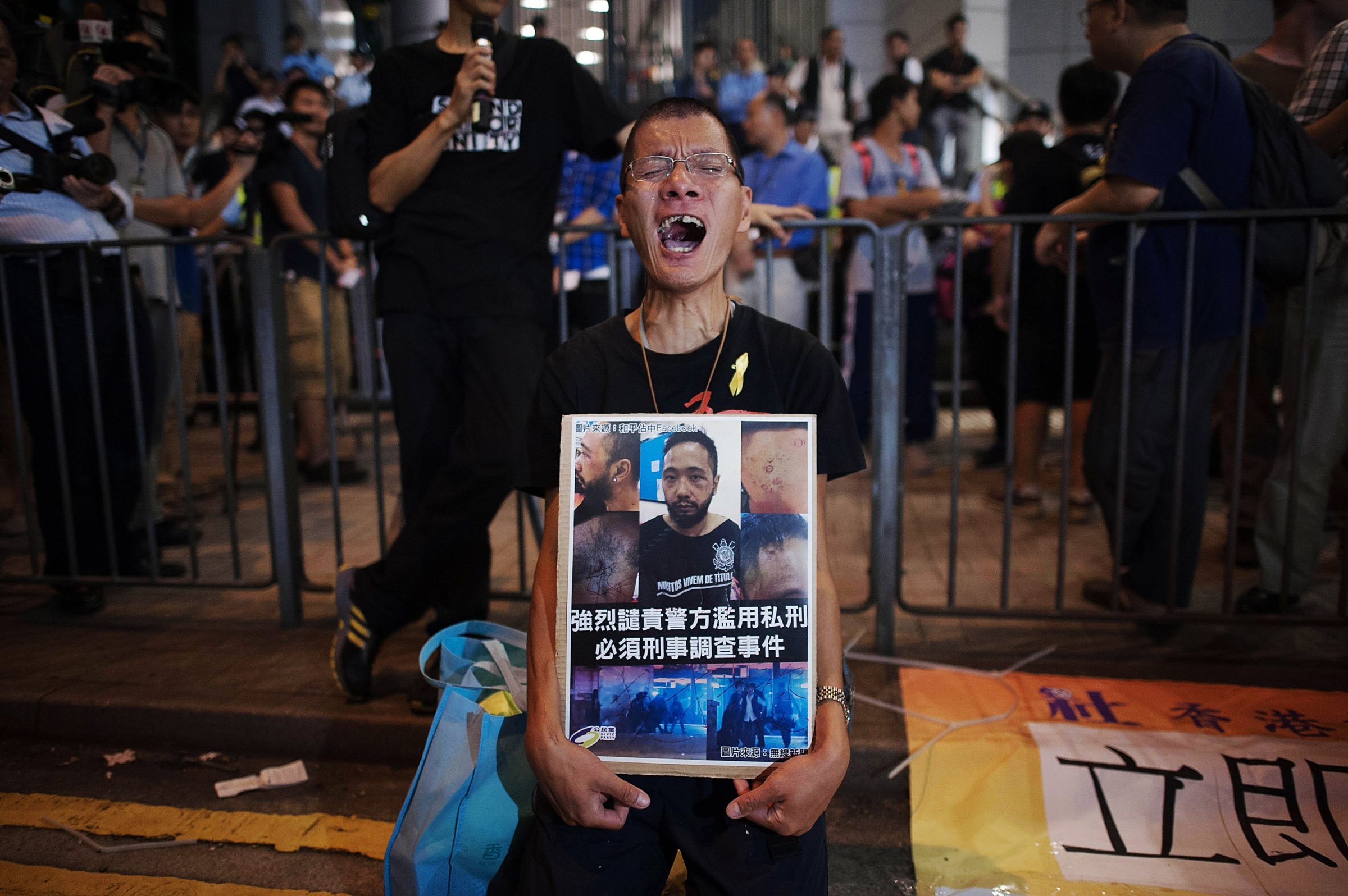
The U.S. has called for a “swift, transparent and complete” investigation into the beating by Hong Kong police of a political activist that was captured by a local television news crew.
The attack took place in the early hours of Wednesday morning local time, during one of the most violent demonstrations in the almost three weeks of pro-democracy protests that have rocked this increasingly divided Chinese city.
“We renew our call for the Hong Kong government to show restraint, and for protesters to continue to express their views peacefully,” U.S. State Department spokeswoman Jen Psaki told reporters, adding that Washington was “deeply concerned by reports of police beating a protester.”
British Prime Minister David Cameron also reiterated calls on Wednesday for Beijing to respect the agreement it signed with Britain before Hong Kong, a former British colony, was returned to China in 1997. The agreement, he says, guarantees to Hong Kongers “rights and freedoms, including those of person, of speech, of the press, of assembly, of association, of travel, of movement, and, indeed, of strike.”
The Hong Kong government has responded to mounting pressure by revisiting the possibility of talks with the Hong Kong Federation of Students (HKFS), one of the main protest groups. At a press conference Thursday, the head of the government, embattled Chief Executive Leung Chun-ying, said the government would negotiate with the HKFS using a vice-chancellor from one of Hong Kong’s universities as a mediator.
This is an abrupt reversal of its position just a week ago, when Leung’s deputy, Chief Secretary Carrie Lam, called off scheduled talks with students, claiming that constructive dialog was “impossible.”
Hong Kong’s protesters have been venting fresh outrage at the police after news video of plainclothes officers assaulting Civic Party member Ken Tsang went viral and photos of his bruised face and chest were shared on social media. In the video, Tsang is arrested before being taken around a corner and beaten while on the ground with his hands bound by a plastic tie.
Public anger has also been galvanized by the arrest of 45 people during the confrontation at which Tsang was arrested, which took place when police prevented demonstrators seeking to barricade a major thoroughfare leading to the main financial district.
A spokesman for the Hong Kong police said at a press conference on Thursday that seven police officers involved in Tsang’s arrest have been suspended and that a criminal investigation into the matter had been launched. Police had on Wednesday reassigned the officers, citing “serious concern” about the videotaped beating, but had also criticized “radical protesters” involved in the early morning confrontation for behaving in “an aggressive manner,” including kicking officers and attacking them with umbrellas.
“Even with their arms raised, this just could hardly be a peaceful means of protest,” police said.
A government statement also attempted to put blame on the protesters for the tumult, saying “protesters threw objects from above, as well as traffic cones” and alleging that some “pushed officers.”
Hong Kong’s protesters are calling on Beijing to grant the territory free elections. At present, Beijing insists on screening candidates for chief executive and on limiting the field to three candidates at most. The incumbent Leung has infuriated protesters by refusing to resign — he is seen as unrepresentative of Hong Kong people — and for saying that their demands have an “almost zero” chance of being realized.
In recent days, Leung has also become embroiled in a financial scandal over millions of dollars in undeclared payments from an Australian engineering company. While he says the payments are legal because they relate to services provided before he took office, the affair has nonetheless further eroded confidence in his leadership.
Meanwhile, protesters continue to hold key commercial arteries for a third week, erecting barricades and tents in what has fast become the most significant political movement in China since the 1989 occupation of Beijing’s Tiananmen Square.
On Wednesday night, more than a thousand people joined a protest against the beating of Tsang, organized by the Social Workers Union. Standing outside police headquarters on Arsenal Street, just around the corner from the main protest encampment on Harcourt Road, the crowds chanted, “Shame, shame, shame” at a line of police officers and expressed disappointment with a force they felt had let them down.
“I can’t believe it,” said one man, a visibly upset social worker who declined to give his name. “This sort of thing happens frequently in mainland China, but not here,” he added.
“It’s so unjust,” said another protester, Linda To, a social worker. “I can’t really describe the pain of seeing such brutality happen here.”
More Must-Reads from TIME
- Why Trump’s Message Worked on Latino Men
- What Trump’s Win Could Mean for Housing
- The 100 Must-Read Books of 2024
- Sleep Doctors Share the 1 Tip That’s Changed Their Lives
- Column: Let’s Bring Back Romance
- What It’s Like to Have Long COVID As a Kid
- FX’s Say Nothing Is the Must-Watch Political Thriller of 2024
- Merle Bombardieri Is Helping People Make the Baby Decision
Write to Elizabeth Barber / Hong Kong at elizabeth.barber@timeasia.com